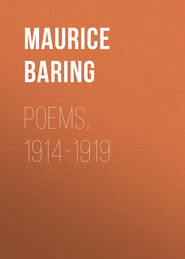По всем вопросам обращайтесь на: info@litportal.ru
(©) 2003-2024.
✖
Overlooked
Настройки чтения
Размер шрифта
Высота строк
Поля
"M. Kranitski has such a funny idea about it," she said.
I asked what the idea was.
"He thinks he is writing a book about all of us."
"Who is the heroine?" I asked.
"Mabel – I think," she said. "She's so pretty. Mr. Rudd admires her. He said she was like a Tanagra, and I can see she puzzles him. He's afraid of her."
"And who is the hero?" I asked.
"I can't imagine," she said. "I expect he has invented one."
"Why is the book private?"
"Because it's about real people."
"Then we may all of us be in it?"
"Yes."
"What made Kranitski think that?" I asked.
"The way he discusses all our characters. Each person who isn't there with all the others who are there. For instance, he discusses Princess Kouragine with Aunt Netty, and Mabel with Princess Kouragine, and you with all of us; and M. Kranitski says he talks about people like a stage manager settling what actors must be cast for a particular play. He checks what one person tells him with what the others say. I have noticed it myself. He talked to me for hours about Mabel one day, and after he had discussed Princess Kouragine with us, he asked Mabel what she thought of her. That is to say, he told her what he thought, and then asked her if she agreed. I don't think he listened to what she said. He hardly ever listens. He talks in monologues. But there must be someone there to listen."
"You have left out one of the characters," I said.
"Have I?"
"The most important one."
"The hero?"
"And the heroine."
"He's sure to invent those."
"I'm not so sure, I think you have left out the most important character."
"I don't think so."
"I mean yourself."
"Oh no, that's nonsense; he never pays any attention to me at all. He doesn't talk about me to Aunt Netty or to the others."
"Perhaps he has made up his mind."
"Yes," she said slowly, "that's just it. He has made up his mind. He thinks I'm a – well, just a lay figure."
I said I was certain she would not be left out if he was writing that kind of book.
She laughed happily – so happily that I imagined her looking radiant and felt that the lamp was lit. I asked her why she was laughing.
"I'm laughing," she said, "because in one sense my novel is over – with the ordinary happy, conventional ending – the reason I wanted to talk to you to-day was to tell you – "
At that moment Mrs. Lennox joined us. Miss Brandon's voice passed quite naturally into another key, as she said:
"Here is Aunt Netty."
"I have been looking for you everywhere," said Mrs. Lennox, "I've got a headache, and we've so many letters to write. When we've done them you can watch me doing my patience."
She said these last words as if she was conferring an undeserved reward on a truant child.
CHAPTER VIII
Later on in the evening, about six o'clock, as I was drinking a glass of water in the Pavilion, someone nearly ran into me and was saved from doing so by the intervention of a stranger who saw at once I was blind, although the other person had not noticed it. He shepherded me away from the danger and apologized. He said he supposed I was an Englishman, and that he was one too. He told me his name was Canning. We talked a little. He asked me if I was staying at the Splendide. I said I was. He said he had hoped to meet some friends of his, who he had understood were staying there too, but he could not find their names on the list of visitors. A Mrs. Lennox, he said, and her niece, Miss Brandon. Did I know them? I told him they were staying at the hotel; not at the hotel proper, but at the annexe, which was a separate building. I described to him where it was. The man's voice struck me. It was so gentle, so courteous, with a tinge of melancholy in it. I asked him if he was taking the waters? He said he hadn't settled. He liked watering places. Then our brief conversation came to an end.
After dinner, Rudd fetched me and I joined the group. I was introduced to the stranger I met in the morning: Captain Canning they called him. Mrs. Summer and Princess Kouragine were sitting with them. They all talked a great deal, except Miss Brandon, who said little, and Captain Canning who said nothing.
The next morning Kranitski met me at the Pavilion, and we talked a great deal. He was in high spirits and looking forward to an expedition to the lakes which Mrs. Lennox had organized. He was going with her, Miss Brandon and others. While we were sitting on a seat in the Galeries the postman went by with the letters. There was a letter for Kranitski, and he asked me if I minded his reading it. He read it. There was a silence and then suddenly he laughed: a short rather mirthless chuckle. We neither of us said anything for a moment, and I felt, I knew, something had happened. There was a curious strain in his voice which seemed to come from another place, as he said: "It is time for my douche. I shall be late. I will see you this evening." He then left me. I saw nobody for the rest of the day.
The next day I saw some of the group in the morning just before déjeuner. Rudd read out a short story to us from a magazine. After luncheon Rudd came up to my room. He wished to have a talk. He had been so busy lately.
"With your book?" I asked.
"No. I have had no time to touch it," he said. "It's all simmering in my mind. I daresay I shall never write it at all."
I asked him who Captain Canning was. He knew all about him. He was the young man who had once been engaged to Miss Brandon, so Mrs. Lennox had told him. But it was quite obvious that he no longer cared for her.
"Then why did he come here?" I asked.
"He caught fever in India and wanted to consult Doctor Sabran, the great malaria expert here. He was not staying on. He was going away in a few days' time. That was one reason. There was another. Donna Maria Alberti, the beautiful Italian, had been here for a night on her way to Italy. Canning had met her in Africa and was said to be devoted to her."
I asked him why he thought Canning no longer cared for Miss Brandon.
"Because," he said, "if he did he would propose to her at once."
"But money," I said.
That was all right now. His uncle had died. He was quite well off. He could marry if he wanted to. He had not paid the slightest attention to Miss Brandon.
"And she?" I asked.
"He is a different person now to what he was, but she is the same. She accepts the fact."
"But does she love anyone else?"
"Oh! that – "











